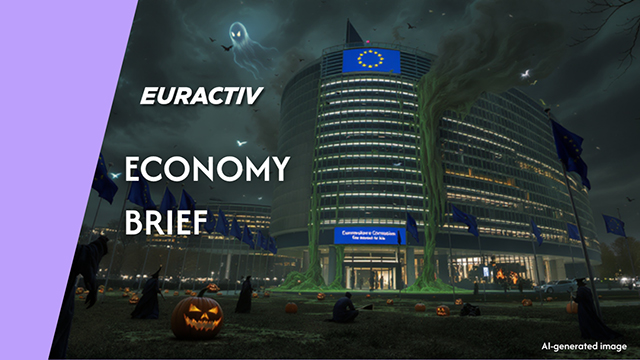 Pic.: Euractiv
Pic.: Euractiv
Investors are spooked, consumers are afraid, and policymakers are haunted by the spectre of a US military withdrawal and potential conflict with Russia. Can Europe overcome its fears?
Halloween came and went this week – and, with it, the annual opportunity for otherwise self-respecting adults to dress up as ghosts, ghouls, and other ghastly entities. Arguably, however, nothing is as spine-chillingly terrifying – and terrified – as the European economy itself, ‘Euractiv’ stresses.
The EU’s growth is horrifyingly slow; demand is dreadfully weak; and foreign investment is at a frightening nine-year low. Businesses, meanwhile, are cursed with high energy prices, US tariffs, and fierce Chinese competition; ordinary citizens, plagued by stagnant wages and tormented by geopolitical uncertainty, are afraid to part with their hard-earned wealth.
Indeed, Europe’s terror is so palpable that it has even stirred its usually workshy politicians into action. Fear of foreigners has compelled EU leaders to pull up the bloc’s migrant drawbridges; fear of Russia and US military abandonment has sparked a splurge in military spending; and fear of firms decamping to China or the US has triggered a wave of regulatory ‘simplification’.
“Europe is suffering from a fear of decline,” said Philipp Lausberg, a senior analyst at the European Policy Centre. “There is a sense that things are going downhill, that we’re losing our prosperity, and that the political and geoeconomic order is changing in a way that isn’t to our advantage.”
Alas, fear begets fear. The increase in defence expenditure has unnerved fiscally conservative policymakers who are still haunted by the nightmare of last decade’s eurozone crisis. Similarly, the rush to slash red tape has alarmed labour groups that are already anxious about stagnant wages and EU governments’ attacks on workers’ rights.
The fear is also viciously cyclical. Consumers’ reluctance to spend is largely responsible for companies’ unwillingness to invest. And companies’ unwillingness to invest, in turn, shapes an economic environment in which consumers are reluctant to spend.
Fear, in other words, is not merely a cause of current EU policymaking. It is also a symptom of the bloc’s current economic malaise, which, in turn, exacerbates the disease.
Legitimate fears?
In fairness, Europeans are right to be afraid. The ‘Doomsday Clock’, set each year by the Bulletin of the Atomic Scientists, is currently fixed at 89 seconds to midnight: the closest humanity has ever been to annihilation.
Interestingly, however, the main threats to humanity cited by the Bulletin – nuclear war, climate change, and the risks posed by disruptive technologies, such as AI – do not always rank among the principal worries cited by most Europeans.
Indeed, some of their concerns might even be counterproductive. For instance, fear of migrants – which surveys show is widespread throughout Europe – makes little sense when, as Mario Draghi points out in his influential report on European competitiveness, the EU is increasingly in need of skilled labour. (Europe will shed roughly 2 million jobs annually by 2040, he notes.)
However, it would be overly simplistic to claim that citizens’ concerns – which also include a lack of access to housing, inflation, and general economic anxiety – are entirely misguided. And it would be an even greater oversimplification to claim that fear – which is amplified by social media and, it must be admitted, many conventional news outlets – is the sole problem afflicting the EU.
The slump in Chinese demand, for instance, was not caused by fear, but rather by Beijing’s strategic foresight and European automakers’ hubris regarding the continued consumer demand for combustion-engine vehicles.
Similarly, US tariffs on EU exports, although ultimately accepted by Brussels over fears of America’s abandonment of Ukraine, were not caused by fear but by Donald Trump’s insanity.
Many also note that the more sweeping reforms proposed by Draghi – such as capital markets integration or bolstering the size of the EU’s long-term budget – would be even more helpful.
Ironically, however, some suggest that in order to do this, fear itself must ultimately be overcome.
“The EU is still too afraid to press the big buttons… that Draghi has put on the table,” said Nils Redeker, acting co-director of the Jacques Delors Centre. “There’s a lingering fear of backlash against meaningful reforms in a polarised political climate.”
Fears of political reprisal might, in other words, be the very emotion that prevents politicians from enacting reforms that would alleviate their electorate’s fears – and ease Europe’s political polarisation.
A complex thought, to be sure. But also a scary one.
read more in our Telegram-channel https://t.me/The_International_Affairs

 10:34 03.11.2025 •
10:34 03.11.2025 •






















